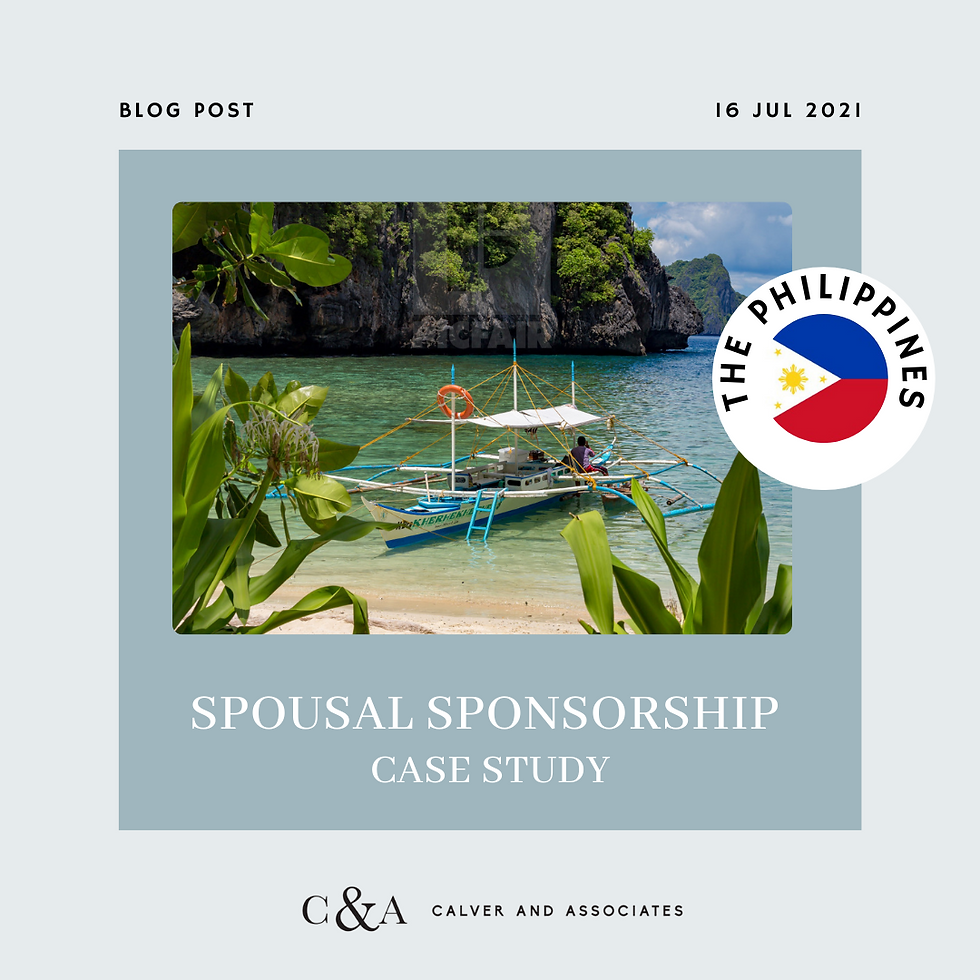3 WAYS YOUR FOREIGN PARTNER CAN JOIN YOU IN CANADA
- Calver Immigration Consulting Inc.

- Feb 14, 2019
- 2 min read
Updated: May 4, 2020
The Canadian Government places a high value on immigration for the purposes of family reunification. The Family Class Sponsorship program was designed to meet these needs, not only for parents, grandparents, and children, but for couples as well. With the rise of online dating, more long distance relationships are developing than ever before. Canadian citizens who are in a genuine relationship with a foreign spouse or partner may be eligible to bring their partner to Canada through the family class sponsorship program.
There are three different classifications of romantic relationships that the Government of Canada recognizes as eligible for Spousal Sponsorship. These include Spousal Sponsorship, Common-Law Sponsorship, and Conjugal Sponsorship. It is important to note that each of these classifications applies to both opposite- and same-sex relationships. However, principal applicants who are living in Canada are not eligible to be sponsored as conjugal partners, either in the Spouse, Common-law in Canada program or the overseas sponsorship program.
SPOUSAL SPONSORSHIP
A spouse is defined by the Government of Canada as a partner with whom you are legally married. If a Canadian citizen or Permanent Resident who is over the age of 18 marries a foreign national who is also over the age of 18, the spouse may be eligible to apply for Spousal Sponsorship. The Canadian sponsor must prove that they can support their spouse financially when they come to Canada.
COMMON-LAW SPONSORSHIP
A person who has been living together with another person in a conjugal relationship for at least one year. To apply for spousal sponsorship in a common-law relationship, you must prove the veracity of the relationship by submitting proof in the form of documentation. You must show that you share the home, support each other financially and emotionally, have children together (if applicable), and present yourselves in public as a couple.
CONJUGAL SPONSORSHIP
A person outside Canada who has had a binding relationship with a sponsor for at least one year, but could not live with their partner. A significant degree of attachment and mutual interdependence between both partners must be shown. The couple must submit proof of the obstacles or restrictions that prevent them from living together or getting married.
For every category of relationship, the couple must provide documents proving the realness of the relationship. Some of the documentation you may provide to prove this include photos of you together, copies of conversations via text or email, household bills with both of your names, joint bank account statements, and more.
RELATED BLOG POSTS:
Our Services
Calver and Associates is a leading provider of Canadian Immigration services in Durham Region. We serve clients in Oshawa, Whitby, Ajax, and beyond. Our Registered Canadian Immigration Consultant has over 10 years of experience in Canadian Immigration law and over four years of experience serving those in the Oshawa area.
We can provide assistance with applications for both temporary and permanent residency in Canada. We handle applications for study permits, permanent residency, family class sponsorship, visitor visas, work permits, and Canadian citizenship. We also handle criminal inadmissibility cases by developing remedies for refusal.





can a long distance relationship be called conjugal
i meet my partner through family connections in may 2020 when covid hit
we exchanged numbers
have been in a long distance relationship since then
we both want to see each other now and get married
Is is possible to apply for conjugal spouse visa?
Top 3 Most Common Problems to Same-Sex Couple Sponsorship Applications
dead link